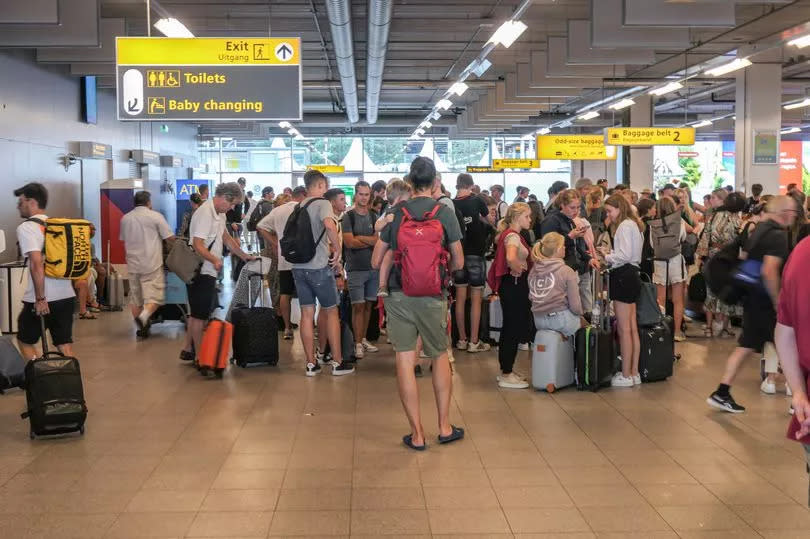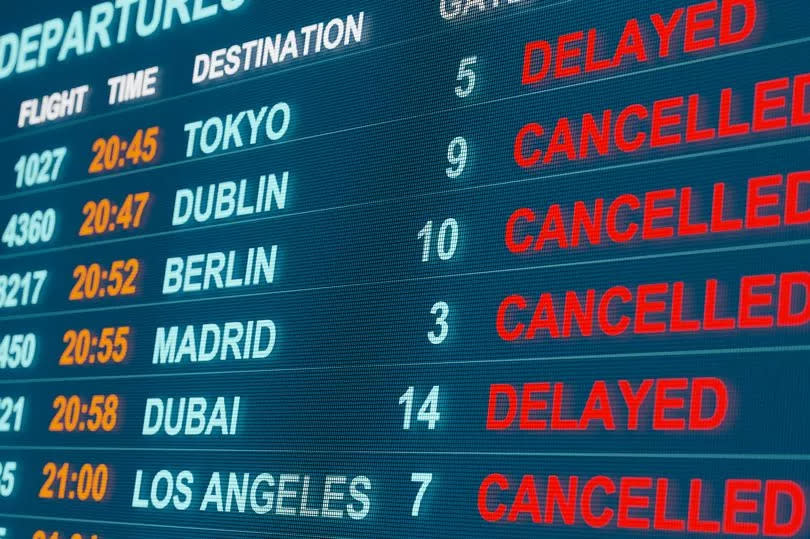How to claim flight delay compensation as new investigation names worst UK airport for delays

Gatwick was the worst airport in the UK for flight delays last year, an investigation has found. Departures from the West Sussex airport were an average of nearly 27 minutes behind schedule in 2023, according to analysis of Civil Aviation Authority (CAA) data by the PA news agency.
The airport, which is the second-busiest in the UK, was badly affected by air traffic control (ATC) staff shortages across Europe last year, and repeatedly suffered the same problem in its own control tower. Gatwick said in a statement it is "working closely with our airline partners to improve on-time performance".
Luton airport had the second poorest punctuality record last year, with an average delay of almost 23 minutes. In third place was Manchester airport, at nearly 22 minutes.
Belfast City (George Best) airport had the best performance, with a typical delay of 12-and-a-half minutes. The average delay for flights across all airports was almost 20 minutes and 42 seconds, down from 23 minutes and 12 seconds in 2022, when the aviation sector struggled to cope with a surge in demand for holidays following the end of coronavirus travel restrictions.
The analysis took into account all scheduled and chartered departures from the 22 commercial UK airports with at least 1,000 outbound flights last year. Cancellations were not included.
Naomi Leach, deputy editor of consumer magazine Which? Travel, said: "It's clear from these latest figures that millions of passengers continued to experience unacceptably long hold-ups last year. This cannot be allowed to become the new normal."
CAA director Tim Johnson said it is vital the aviation sector "focuses on resilience" ahead of the summer holiday period to "keep passenger disruption to a minimum".
He added: "Where people do find themselves facing disruption, we want them to be well-informed about the duty of care that they are entitled to."
Julia Lo Bue-Said, chief executive of Advantage Travel Partnership, a network of independent travel agents, said flight disruption is "always incredibly frustrating".
She continued: "Any delay can have significant knock-on effects to both leisure and business travellers. With millions of Brits set to travel abroad this summer, it's vital for the UK's airports alongside all parts of the travel eco-system to continually work together to ensure the system is as efficient as it can be."

When flights are significantly delayed or cancelled, airlines are required under consumer laws to provide passengers with assistance such as refreshments, a means of communication and overnight accommodation if required. If the cause of disruption is under an airline's control, passengers are also due compensation of up to £520 depending on the length of the delay and the distance of the flight. But air traffic control (ATC) issues are generally considered to be an "extraordinary circumstance", meaning affected passengers are not entitled to payouts.
Gatwick said in a statement: "As the most efficient single runway airport in the world, we aim to deliver a seamless passenger experience. The majority of cancellations are caused by poor weather, airspace constraints across Europe and inefficient third party ground operations.
"We are working closely with our airline partners to improve on-time performance. In addition, we have published a six-year capital investment programme setting out significant improvements to develop and enhance infrastructure and facilities to build the resilience of the airport."
Gatwick imposed a temporary cap on flights in September 2023 in an attempt to reduce the number of short-notice cancellations and delays due to staff shortages in its ATC tower.
A spokesperson for trade body the Airport Operators Association said: "Airports work extremely hard to minimise delays while providing a positive, safe and secure experience for passengers. These figures do not provide any of the context around operating in a global environment and do not give the travelling public a clear picture of how air travel operates."
What you can claim when your flight is delayed or cancelled
What flights are covered by UK consumer law?
Flights operated by an airline departing from a UK airport, flights operated by a UK or EU airline arriving at a UK airport, or flights operated by a UK airline arriving at an EU airport.
How long must a flight be delayed before I am entitled to assistance?
It depends on the distance of the flight.
For flights under 1,500km (932 miles) such as from Glasgow to Amsterdam: at least two hours.
For flights between 1,500km (932 miles) and 3,500km (2,175 miles) such as from Manchester to Marrakesh: at least three hours.
For flights over 3,500km (2,175 miles) such as from Heathrow to New York: at least four hours.
What should this assistance include?
A reasonable amount of food and drink (often via vouchers), a means for you to communicate (often by refunding the cost of phone calls), and accommodation and transfers if an overnight stay is required.
What happens in reality?
Airlines often fail to provide this assistance during major disruption due to being overwhelmed by requests and there being a shortage of available rooms in local hotels. The Civil Aviation Authority (CAA) says in this scenario, passengers can organise their own assistance and claim the costs back from the airline by submitting receipts.
Does that mean I should book a luxury hotel suite and order champagne?
Airlines are unlikely to reimburse you for that. The CAA advises passengers not to "spend more than is reasonable".
How long must assistance be provided?
Until your flight takes off or you accept a refund after deciding not to travel.
What about getting to my destination?
If a flight is cancelled, airlines are required to get you to your destination if you still want to travel. Most will book you onto another of their flights, but you may be entitled to travel with another airline or by an alternative mode of transport if it will get you to your destination significantly sooner. Passengers doing this are often required to purchase their own tickets and submit a claim to their original airline for reimbursement.
What if I no longer want to travel?
You are entitled to a refund if you have been delayed by more than five hours.
Am I entitled to compensation for a delayed flight?
Airlines may be liable for compensation if the reason for a delay is deemed within their control, such as a fault with the aircraft or pilot sickness. Causes of disruption classed as outside their control include severe weather, air traffic control restrictions and security alerts.
How much can I claim for a delay?
It depends on the length of the flight and how much its arrival was later than scheduled.
For flights under 1,500km (932 miles): £220 for a delay of at least three hours.
For flights between 1,500km (932 miles) and 3,500km (2,175 miles): £350 for a delay of at least three hours.
For flights over 3,500km (2,175 miles): £260 for a delay of at least three hours but less than four hours.
For flights over 3,500km (2,175 miles): £520 for a delay of at least four hours.
What if my flight is cancelled?
You are entitled to a refund or a replacement flight.
What are my rights to assistance?
The same as if your flight is delayed.
Can I claim compensation if my flight is cancelled?
You can if the reason is deemed within the airline's control, you received no more than 14 days' notice, and depending on the timings of a new flight offered.
If I can claim, how much money will I get?
Between £110 and £520, depending on the length of the route and the timings of a new flight.

 Yahoo News
Yahoo News 
